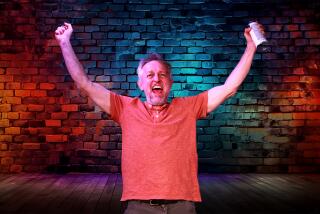Taking a Radio Trip Down ‘Craven Street’ Into History
- Share via
Take a dramatic television miniseries and eliminate the pictures and what have you got?
“A very special way of enjoying drama,” says Yuri Rasovsky, 48, who has written and produced a five-part account of Benjamin Franklin’s life that begins at 9 tonight on many public radio stations.
Rasovsky, a two-time Peabody Award-winning radio dramatist and one of the last practitioners of the art, believes there is something special about radio that is generally overlooked these days.
“I could do ‘Hunter’ episodes on radio and they would sound five times more exciting,” he says.
The Franklin drama chronicles the Founding Father’s life as a Colonial agent in London prior to the American Revolution. Facing increasing tensions between the England he respected and the America he had come to love, Franklin finds himself torn between his loyalties and his conscience--and forced to make decisions that directly influenced the American Revolution.
Featuring George Grizzard as the well-intentioned but troubled Franklin and Elizabeth Montgomery as his mindful conscience, “Craven Street” offers a chapter of American history many students never learn. Nigel Hawthorne, Martin Sheen, Alan Young and Efrem Zimbalist Jr. also star in the American Dialogues Foundation production.
In an age in which television and the home video industry have made radio drama seem like a thing of the past, could Rasovsky’s $300,000 National Endowment for the Humanities project be too ambitious? The USC artist-in-residence and proud father of radio dramas from Homer’s “Odyssey” to Marvel Comics’ “Spider Man” thinks not. “It’s work listening to radio,” he admits. “I think that’s one of the reasons it’s enjoyable. It’s like the difference between watching a volleyball game and being in one.”
The “Craven Street” project--named after Franklin’s London residence--was three years in the making, with Rasovsky handling the research and directing, as well as writing and producing. He delved into diaries, memoirs and newspaper clippings for the basis of his reconstruction of events.
“The idea is not to put words in these people’s mouths, but to use words they spoke, or words they could have spoken,” he says. He strived for meticulous historical accuracy, right down to the stuttering of one minor character.
But to illustrate Franklin’s many unspoken moral wrestling matches, Rasovsky created a part for his ever-questioning and painfully honest conscience.
Rasovsky, who ran the National Radio Theater of Chicago for 14 years and who has worked with stars such as Edward Asner, Richard Dreyfuss and James Earl Jones, says he felt drawn to radio as a child growing up in Chicago in the 1950s. Television, he recalls, was not his friend.
“I hated TV because it was so cheap,” says Rasovsky, who admits to intentionally breaking his family’s television sets on numerous occasions so “we could listen to radio again.” By the late 1960s, he had dropped out of high school, rerouting his education to the stages of Chicago. “I was always typecast as perverts,” he recalls of his early theater career.
When theater work in the city seemed to dry up, he turned to his first love. A 1973 radio production of the classic German silent film “The Cabinet of Dr. Caligari” launched the National Radio Theater and Rasovsky’s career. The Peabody Awards followed, along with collaborations with National Public Radio and the BBC.
As for the future, Rasovsky is toying with plans for a cassette theater repertory company that would send radio dramas to subscribers on a regular basis. And he also would like to bring his “highbrow” radio productions to television--if TV would have him.
“It’s easy to be good, and it’s easy to be commercial,” he says with a sigh. To be both , he adds, is the next logical step.
“There’s no money and there’s no glory in radio. It’s the challenge of the work that keeps you going. And if it’s easy, there’s no point.”
“Craven Street” will be broadcast today through Friday this week in one-hour installments at 9 p.m. on KUSC-FM (91.5) in Los Angeles; KPSC-FM (88.5) in Palm Springs; KFAC-FM (88.7) in Santa Barbara; KVCR-FM (91.9) in San Bernardino and KCPB-FM (91.1) in Ventura County. On Sunday, KPCC-FM (89.3) in Pasadena will broadcast all five hours, beginning at 9 a.m. For other broadcast locations, call (800) 266-8972.
More to Read
The complete guide to home viewing
Get Screen Gab for everything about the TV shows and streaming movies everyone’s talking about.
You may occasionally receive promotional content from the Los Angeles Times.






